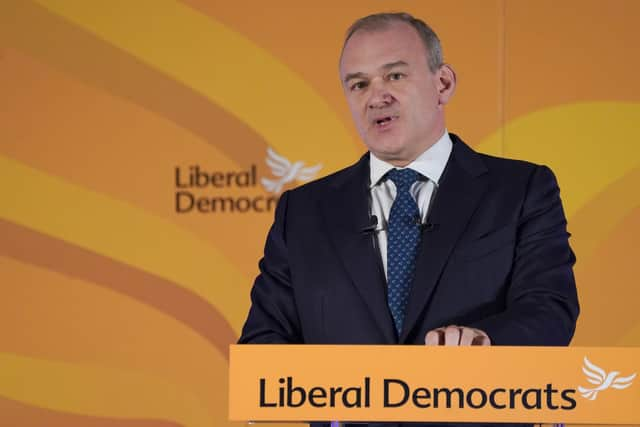Lib Dem leader calls for new rural communities minister following DEFRA "neglect" of countryside
Addressing the CLA’s annual Rural Business Conference in London, Liberal Democrat Leader Sir Ed Davey backed a key policy of the Country Land and Business Association’s (CLA) Rural Powerhouse campaign to create a senior cross departmental Minister for Rural Communities.
His comments were heard by DEFRA Secretary Dr Thérèse Coffey, farming minister Mark Spencer and more than 400 CLA members.
Advertisement
Hide AdAdvertisement
Hide AdHe warned that a culture of government departments passing the buck has led to “the neglect we are now witnessing of rural communities”.


In a damning address, Sir Ed Davey, said: “We need to start with a change to the way the Government thinks about rural communities.
“Siloing off ‘rural affairs’ in DEFRA plainly isn’t working. It leads to the neglect we are now witnessing of rural communities across government.
“Why aren’t rural businesses a priority for the Department for Business? Why isn’t rural transport a priority for the Department for Transport? Why aren’t rural health services a priority for the Department for Health? Why aren’t rural schools and colleges a priority for the Department for Education? Why isn’t rural connectivity a priority for the Department for Digital, Culture, Media and Sport?
Advertisement
Hide AdAdvertisement
Hide Ad“In part at least, it’s because they all think ‘That’s DEFRA’s problem’.”


He added that it wasn’t good enough that rural affairs are mixed in with nine other areas of responsibility for Defra which include food labelling, noise and global trade.
A designated minister is needed to make sure rural communities are not getting left behind, he added.
"I’m calling on the Prime Minister to appoint a cross-departmental Minister for Rural Communities, to make sure that rural voices are heard across Whitehall when decisions are made. So that rural communities aren’t forgotten or ignored by any part of government ever again.”
Advertisement
Hide AdAdvertisement
Hide AdIt follows a the publication earlier this year of a major report by the All Party Parliamentary Group for the Rural Powerhouse, which called for structural change in how Government approaches the rural economy.
It set out an economic blueprint to revitalise the rural economy, potentially to the tune of £43bn. The report concluded that no government in recent memory has had a program to unlock the economic and social potential of the countryside.
Decades of neglect have left the countryside in a state of stagnation with a 19 per cent productivity gap between the rural economy and the national average, it also said.
CLA president, Mark Tufnell told the meeting, the CLA’s flagship annual event, that the delays to the rollout of the Environmental Land Management (ELM) schemes were “unacceptable,” comparing the lack of clarity on payment rates to buying “something from the shop without knowing the price.”
Advertisement
Hide AdAdvertisement
Hide AdThe confusion was also damaging the CLA’s relationship with the government and farmers were losing confidence, he said, while also criticising the government’s track record in supporting rural businesses across the country, pointing towards a planning regime that seems “designed to hold the rural economy back,” a lack of affordable housing driving away young people, and infrastructure and connectivity preventing many from even “operating in the 21st century”.
Dr Coffey confirmed to delegates that the review into ELM has concluded and said that its purpose was to “secure the biggest bang for our buck in the way we spend public money and that it is easy and attractive for farmers to get involved.
She said: “The review is now complete and that we are moving ahead with the transition on the same timescale and with three schemes.
“All the funding that we are taking out of reductions in BPS will continue to be made available to farmers through a combination of one-off grants and ongoing schemes and the advice you need to get your business on the right footing for the future.
“As we make those planned, steady reductions to BPS payments we will pay you to take action through our three environmental land management schemes.”
